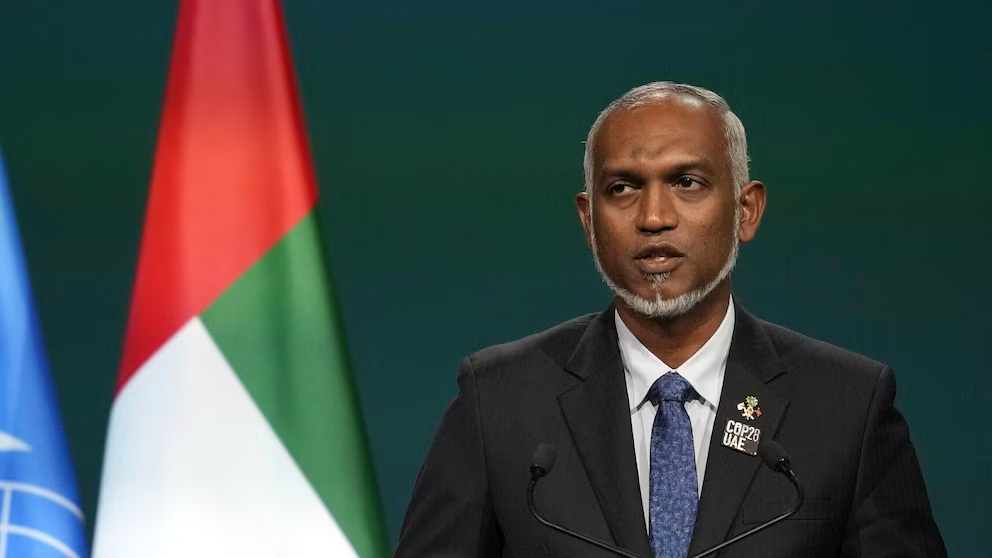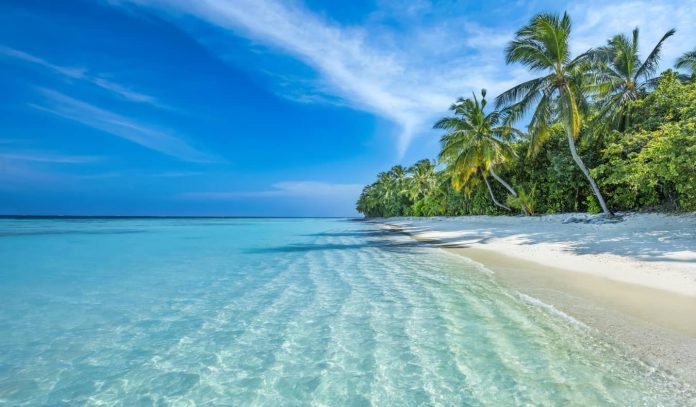The Maldives says it will ban the entry of Israelis amid public anger in the predominantly Muslim archipelago over the war in Gaza.
The office of Maldives’ President Mohamed Muizzu said his cabinet had decided to change laws to prevent Israeli passport holders from entering the country, and it will establish a subcommittee to oversee the process. It also said the president will appoint a special envoy to assess Palestinian needs and launch a fundraising campaign. In response, Israel’s foreign ministry recommended its citizens – and those with dual citizenship – do not travel to the Maldives. It also recommended that those currently there consider leaving.

“For Israeli citizens already in the country, it is recommended to consider leaving, because if they find themselves in distress for any reason, it will be difficult for us to assist,” the ministry said. Some 528 Israeli nationals visited the Maldives in the first four months of this year, down from 4,644 in the same period in 2023, according to Maldives government data. Nearly 11,000 Israelis visited the archipelago last year, accounting for 0.6% of total tourist arrivals.
The Maldives: A Jewel in the Indian Ocean
The Maldives, an enchanting archipelago in the Indian Ocean, is renowned for its stunning natural beauty, vibrant marine life, and luxurious resorts. Comprising 26 atolls and over 1,000 coral islands, the Maldives offers a unique blend of seclusion, adventure, and cultural richness. This essay explores the geographical, cultural, economic, and environmental aspects of this island nation, highlighting its allure and the challenges it faces.
The Maldives stretches across approximately 298 square kilometres, making it one of the most geographically dispersed countries in the world. The atolls are composed of live coral reefs and sand bars, forming a double chain of 1,192 islands, of which around 200 are inhabited. The capital, Malé, is one of the world’s smallest national capitals but serves as the political, economic, and cultural hub of the Maldives.
The islands are famed for their pristine white-sand beaches, crystal-clear turquoise waters, and abundant marine biodiversity. The coral reefs of the Maldives are home to over 2,000 species of fish, making it a haven for snorkelers and divers. The underwater landscape includes vibrant coral gardens, dramatic overhangs, and deep-sea drop-offs, creating an unparalleled diving experience.
The Maldivian culture is a tapestry woven from its historical connections with various trading nations, including India, Sri Lanka, Arabia, Persia, Indonesia, Malaysia, and Africa. This cultural amalgamation is evident in the local language, Dhivehi, which incorporates elements from Sanskrit, Arabic, and other languages.
Traditional Maldivian music and dance, such as Boduberu, reflect African influences, while crafts like mat weaving and lacquer work showcase indigenous skills passed down through generations. Islam, the state religion, plays a central role in the daily lives of Maldivians, influencing their customs, attire, and festivals.
Tourism is the backbone of the Maldivian economy, contributing nearly 28% to the GDP and employing a significant portion of the population. The Maldives is synonymous with luxury tourism, offering exclusive resorts, overwater bungalows, and private island experiences. These high-end resorts cater to affluent tourists seeking privacy and unparalleled natural beauty.
Apart from tourism, fishing is a vital sector, providing sustenance and employment to many Maldivians. The country’s fishing industry is renowned for its sustainable practices, particularly pole-and-line tuna fishing, which has earned international recognition.
However, the Maldivian economy faces challenges, including dependency on tourism, which makes it vulnerable to global economic fluctuations and environmental events. Efforts are being made to diversify the economy, including developing sectors like information technology and renewable energy.
The Maldives is on the frontline of climate change, grappling with rising sea levels, coral bleaching, and extreme weather events. With an average ground level of 1.5 metres above sea level, it is the lowest country in the world, making it highly susceptible to flooding and erosion. The existential threat posed by climate change has led the Maldivian government to advocate strongly for global climate action.
To mitigate these challenges, the Maldives is investing in renewable energy sources, coral reef conservation projects, and sustainable tourism practices. Initiatives like the creation of marine protected areas and coral restoration programmes are crucial in preserving the natural environment and biodiversity of the islands.
KEEP US ALIVE and join us in helping to bring reality and decency back by SUBSCRIBING to our Youtube channel: https://www.youtube.com/channel/UCQ1Ll1ylCg8U19AhNl-NoTg AND SUPPORTING US where you can: Award Winning Independent Citizen Media Needs Your Help. PLEASE SUPPORT US FOR JUST £2 A MONTH https://dorseteye.com/donate/







